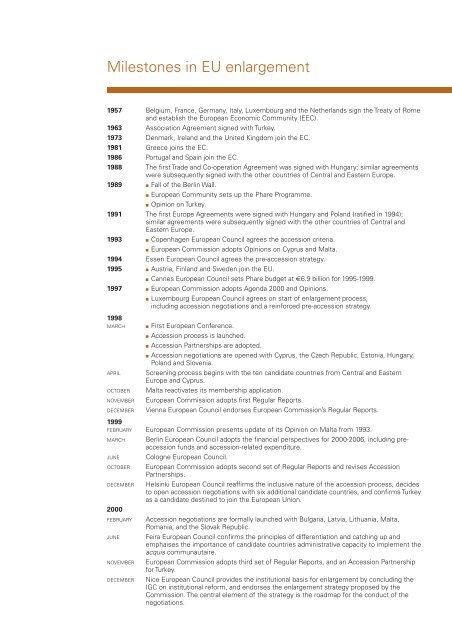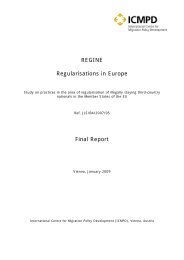European Union Enlargement - An historic opportunity
European Union Enlargement - An historic opportunity
European Union Enlargement - An historic opportunity
Create successful ePaper yourself
Turn your PDF publications into a flip-book with our unique Google optimized e-Paper software.
Milestones in EU enlargement<br />
1957 Belgium, France, Germany, Italy, Luxembourg and the Netherlands sign the Treaty of Rome<br />
and establish the <strong>European</strong> Economic Community (EEC).<br />
1963 Association Agreement signed with Turkey.<br />
1973 Denmark, Ireland and the United Kingdom join the EC.<br />
1981 Greece joins the EC.<br />
1986 Portugal and Spain join the EC.<br />
1988 The first Trade and Co-operation Agreement was signed with Hungary; similar agreements<br />
were subsequently signed with the other countries of Central and Eastern Europe.<br />
1989 ■ Fall of the Berlin Wall.<br />
■ <strong>European</strong> Community sets up the Phare Programme.<br />
■ Opinion on Turkey.<br />
1991 The first Europe Agreements were signed with Hungary and Poland (ratified in 1994);<br />
similar agreements were subsequently signed with the other countries of Central and<br />
Eastern Europe.<br />
1993 ■ Copenhagen <strong>European</strong> Council agrees the accession criteria.<br />
■ <strong>European</strong> Commission adopts Opinions on Cyprus and Malta.<br />
1994 Essen <strong>European</strong> Council agrees the pre-accession strategy.<br />
1995 ■ Austria, Finland and Sweden join the EU.<br />
■ Cannes <strong>European</strong> Council sets Phare budget at €6.9 billion for 1995-1999.<br />
1997 ■ <strong>European</strong> Commission adopts Agenda 2000 and Opinions.<br />
■ Luxembourg <strong>European</strong> Council agrees on start of enlargement process,<br />
including accession negotiations and a reinforced pre-accession strategy.<br />
1998<br />
MARCH<br />
APRIL<br />
OCTOBER<br />
NOVEMBER<br />
DECEMBER<br />
■ First <strong>European</strong> Conference.<br />
■ Accession process is launched.<br />
■ Accession Partnerships are adopted.<br />
■ Accession negotiations are opened with Cyprus, the Czech Republic, Estonia, Hungary,<br />
Poland and Slovenia.<br />
Screening process begins with the ten candidate countries from Central and Eastern<br />
Europe and Cyprus.<br />
Malta reactivates its membership application.<br />
<strong>European</strong> Commission adopts first Regular Reports.<br />
Vienna <strong>European</strong> Council endorses <strong>European</strong> Commission’s Regular Reports.<br />
1999<br />
FEBRUARY <strong>European</strong> Commission presents update of its Opinion on Malta from 1993.<br />
MARCH Berlin <strong>European</strong> Council adopts the financial perspectives for 2000-2006, including preaccession<br />
funds and accession-related expenditure.<br />
JUNE Cologne <strong>European</strong> Council.<br />
OCTOBER <strong>European</strong> Commission adopts second set of Regular Reports and revises Accession<br />
Partnerships.<br />
DECEMBER Helsinki <strong>European</strong> Council reaffirms the inclusive nature of the accession process, decides<br />
to open accession negotiations with six additional candidate countries, and confirms Turkey<br />
as a candidate destined to join the <strong>European</strong> <strong>Union</strong>.<br />
2000<br />
FEBRUARY Accession negotiations are formally launched with Bulgaria, Latvia, Lithuania, Malta,<br />
Romania, and the Slovak Republic.<br />
JUNE Feira <strong>European</strong> Council confirms the principles of differentiation and catching up and<br />
emphaises the importance of candidate countries administrative capacity to implement the<br />
acquis communautaire.<br />
NOVEMBER <strong>European</strong> Commission adopts third set of Regular Reports, and an Accession Partnership<br />
for Turkey.<br />
DECEMBER Nice <strong>European</strong> Council provides the institutional basis for enlargement by concluding the<br />
IGC on institutional reform, and endorses the enlargement strategy proposed by the<br />
Commission. The central element of the strategy is the roadmap for the conduct of the<br />
negotiations.

















